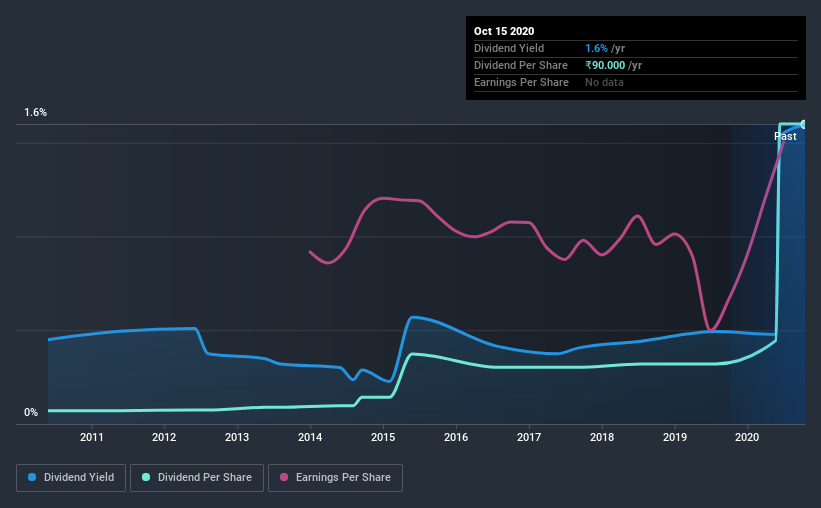Why Bayer CropScience Limited (NSE:BAYERCROP) Is A Dividend Rockstar

Dividend paying stocks like Bayer CropScience Limited (NSE:BAYERCROP) tend to be popular with investors, and for good reason - some research suggests a significant amount of all stock market returns come from reinvested dividends. Unfortunately, it's common for investors to be enticed in by the seemingly attractive yield, and lose money when the company has to cut its dividend payments.
While Bayer CropScience's 1.6% dividend yield is not the highest, we think its lengthy payment history is quite interesting. Some simple analysis can offer a lot of insights when buying a company for its dividend, and we'll go through this below.
Click the interactive chart for our full dividend analysis

Payout ratios
Dividends are usually paid out of company earnings. If a company is paying more than it earns, then the dividend might become unsustainable - hardly an ideal situation. So we need to form a view on if a company's dividend is sustainable, relative to its net profit after tax. Bayer CropScience paid out 19% of its profit as dividends, over the trailing twelve month period. We'd say its dividends are thoroughly covered by earnings.
We also measure dividends paid against a company's levered free cash flow, to see if enough cash was generated to cover the dividend. Bayer CropScience's cash payout ratio last year was 16%. Cash flows are typically lumpy, but this looks like an appropriately conservative payout. It's encouraging to see that the dividend is covered by both profit and cash flow. This generally suggests the dividend is sustainable, as long as earnings don't drop precipitously.
With a strong net cash balance, Bayer CropScience investors may not have much to worry about in the near term from a dividend perspective.
Consider getting our latest analysis on Bayer CropScience's financial position here.
Dividend Volatility
Before buying a stock for its income, we want to see if the dividends have been stable in the past, and if the company has a track record of maintaining its dividend. For the purpose of this article, we only scrutinise the last decade of Bayer CropScience's dividend payments. The dividend has been stable over the past 10 years, which is great. We think this could suggest some resilience to the business and its dividends. During the past 10-year period, the first annual payment was ₹4.0 in 2010, compared to ₹90.0 last year. Dividends per share have grown at approximately 37% per year over this time.
It's rare to find a company that has grown its dividends rapidly over 10 years and not had any notable cuts, but Bayer CropScience has done it, which we really like.
Dividend Growth Potential
Dividend payments have been consistent over the past few years, but we should always check if earnings per share (EPS) are growing, as this will help maintain the purchasing power of the dividend. Bayer CropScience has grown its earnings per share at 4.7% per annum over the past five years. Growth has been hard to come by. However, the payout ratio is low, and some companies can deliver adequate dividend performance simply by increasing the payout ratio.
Conclusion
When we look at a dividend stock, we need to form a judgement on whether the dividend will grow, if the company is able to maintain it in a wide range of economic circumstances, and if the dividend payout is sustainable. First, we like that the company's dividend payments appear well covered, although the retained capital also needs to be effectively reinvested. Second, earnings growth has been mediocre, but at least the dividends have been relatively stable. All things considered, Bayer CropScience looks like a strong prospect. At the right valuation, it could be something special.
Market movements attest to how highly valued a consistent dividend policy is compared to one which is more unpredictable. Meanwhile, despite the importance of dividend payments, they are not the only factors our readers should know when assessing a company. For instance, we've picked out 1 warning sign for Bayer CropScience that investors should take into consideration.
Looking for more high-yielding dividend ideas? Try our curated list of dividend stocks with a yield above 3%.
If you’re looking to trade Bayer CropScience, open an account with the lowest-cost* platform trusted by professionals, Interactive Brokers. Their clients from over 200 countries and territories trade stocks, options, futures, forex, bonds and funds worldwide from a single integrated account. Promoted
Valuation is complex, but we're here to simplify it.
Discover if Bayer CropScience might be undervalued or overvalued with our detailed analysis, featuring fair value estimates, potential risks, dividends, insider trades, and its financial condition.
Access Free AnalysisThis article by Simply Wall St is general in nature. It does not constitute a recommendation to buy or sell any stock, and does not take account of your objectives, or your financial situation. We aim to bring you long-term focused analysis driven by fundamental data. Note that our analysis may not factor in the latest price-sensitive company announcements or qualitative material. Simply Wall St has no position in any stocks mentioned.
*Interactive Brokers Rated Lowest Cost Broker by StockBrokers.com Annual Online Review 2020
Have feedback on this article? Concerned about the content? Get in touch with us directly. Alternatively, email editorial-team@simplywallst.com.
About NSEI:BAYERCROP
Bayer CropScience
Engages in the manufacture, sale, and distribution of insecticides, fungicides, herbicides, and various other agrochemical products and corn seeds in India, Germany, Bangladesh, and internationally.
Flawless balance sheet with reasonable growth potential and pays a dividend.


